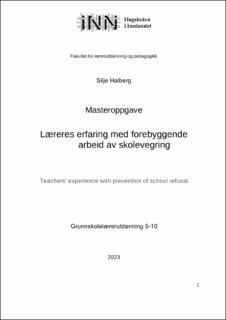Læreres erfaring med forebyggende arbeid av skolevegring
Master thesis
Permanent lenke
https://hdl.handle.net/11250/3079794Utgivelsesdato
2023Metadata
Vis full innførselSamlinger
Sammendrag
Denne masteroppgaven er en kvalitativ studie som tar utgangspunkt i intervju med fire lærere og deres erfaringer i arbeid med forebygging av skolevegring. Formålet har vært å belyse hvordan lærere forstår begrepet skolevegring, hvilke tiltak de anser som virkningsfulle og hva slags utfordringer de møter på i arbeid med å forebygge skolevegring. Med bakgrunn i tematikken er oppgavens problemstilling følgende: Hvilke erfaringer har lærere med å forebygge skolevegring på ungdomstrinnet?
Gjennom drøftingen av hovedfunn fremkommer det at lærere som deltok i denne studien ga sammenfallende beskrivelser av fenomenet skolevegring. Informantene beskriver elever med skolevegring som ønsker å gå på skolen, men som strever med å gå på skolen av ulike årsaker. Det er en bred enighet blant informantene at et godt fraværssystem er viktig for å kunne kartlegge og følge opp fraværet for å finne ut årsaken til fraværet. Informantene vektlegger et godt læringsmiljø som selve grunnpilaren for å forebygge fravær. Tiltak som trygghet, struktur og forutsigbarhet, et godt klassemiljø, et godt samarbeid mellom skole og hjem og omsorg for elevene trekkes frem av informantene som erfaringsmessig kan virke forebyggende mot skolevegring. Resultatene blir drøftet opp mot kunnskapsstatusen og det teoretiske rammeverket som ligger til grunn for oppgaven.
Informantene opplever at de gjør mye riktig i det forebyggende arbeidet og de har fått en rekke erfaringer i hvilke tiltak som er virkningsfulle. Informantene understreker at skolevegring er et såpass så komplekst problem som gjør at det kreves mer kompetanse utover det skolen har. Et siste funn i studien er at informantene trekker frem utfordringer knyttet til samfunnsendringer og psykisk helse som årsaker til skolevegring. Det etterlyses mer oppfølging av ungdom som sliter psykisk og tettere samhandling med eksterne støtteapparater som kan veilede og støtte skolen i arbeid med kartlegging og tilrettelegging av skolevegring som handler om faktorer som ikke kan knyttes til skolen. This masters thesis is a qualitative research that is based on interviews with four teachers and their experiences in working with prevention of school refusal. The purpose of this thesis has been to highlight how teachers understand the term school refusal, which measures they see as effective, and what challenges they face in working with the prevention of school refusal. With background in the subject matter, the thesis question is as follows: What experiences do teachers have with preventing school refusal in lower secondary school?
Through discussion of the main finds, it appears that the teachers who partook in this study gave coinciding descriptions of the phenomenon of school refusal. The informants describes pupils with school refusal as willing, but still struggle attending school due to various reasons. There is broad agreement amongst the informants that a potent abstence system was important to survey and follow up the absense, thus finding the reason for it. The informants highlights a good learning environment as the main pillar in preventing absense. Measures such as safety, structure and predictability, a good class environment, cooperation between school and home and care for the pupils were cited by the informants as experiental reasons that could prevent school refusal. The results are discussed against the knowledge status and the theoretical framework that is the basis for the thesis.
The informants experience that they do a multitude of things correctly in the preventative work, and they have garnered a range of experiences as to which measures are effective. The informants emphasize that school refusal is such a complex problem that it requires more competence than is available at school One last find in the thesis is that the informants highlights challenges connected to societal changes og psychological health as reasons for school refusal. More follow-up of young people who struggle with mental health issues is called for, as well as closer interaction with external support systems that can guide and support the school in work with mapping and facilitating school refusal that is not connected to school itself.
